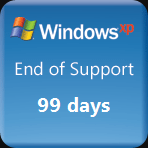I could write a blog post that repeats the things I said bout XP here for Windows 2003 with even some more drama attached so I won’t. There’s plenty about that on the internet and you can always read these blogs again:
- Legacy Apps Preventing Your Move From Windows XP to Windows 8.1?
- The Zombie ISV®
- April 24th–Windows 2003 Is 10 Years Old
I also refer you to a old tweet of mine that got picked up by some one and he kind of agreed:
Replace “XP” with “Server 2003” and voila. Instant insight into the situation. You are blocking yourself from moving ahead and it getting worse by the day. All IT systems & solutions rot over time. They become an ever bigger problem to manage and maintain, costing you time, effort, money and lost opportunities due to blocking to progress. There comes a day that creative solutions won’t pop up anymore like the one in this blog post Windows XP Clients Cannot Execute Logon Scripts against a Windows Server 2012 R2 Domain Controller – Workaround and more recently this on where people just waited to long to move AD over from Windows Server 2003 to something more recent It turns out that weird things can happen when you mix Windows Server 2003 and Windows Server 2012 R2 domain controllers. All situations where not moving ahead out of fear to break stuff actually broke the stuff.
In the environments I manage I look at the technology stack and plan the technologies that will be upgraded in the coming 12 months in the context of what needs to happen to support & sustain initiatives. This has the advantage that the delta between versions & technologies can never become to big. It avoids risk because it doesn’t let delta grow for 10 years an blocks introducing “solutions” that only supports old technology stacks. It make sure you never fall behind too much, pay off existing technology debt in a timely fashion and opens up opportunities & possibilities. That’s why our AD is running Windows Server 2012 R2 and our ADFS was moved to 3.0 already. It’s not because a lot of things have become commodities you should hand ‘m over to the janitor in break/fix mode. Oh the simplicity by which some wander this earth …
OODA
Observe, Orient, Decide, Act. Right now in 2014 we’ve given management and every product/application owner their marching orders. Move away from any Windows 2008 / R2 server that is still in production. Why? They demand a modern capable infrastructure that can deliver what’s needed to grasp opportunities that exits with current technology. In return they cannot allow apps to block this. It’s as easy and simple as that. And we’ll stick to the 80/20 rule to call it successful and up the effort next year for the remainder. Whether it’s an informal group of dedicated IT staff or a full blown ITIL process that delivers that doesn’t matter. It’s about the result and if I still see Windows 7 or Windows 2008 R2 being rolled out as a standard I look deeper and often find a slew of Windows 2003 or even Windows 2000 servers, hopefully virtualized by now. But what does this mean? That you’re in a very reactive modus & in a bad place. Courage & plans are what’s needed. Combine this with skills to deal with the fact that no plan ever woks out perfectly. Or as Mike Tyson said “Everybody has a plan until they get punched in the mouth. … Then, like a rat, they stop in fear and freeze.”
Organizations that still run XP and Windows Server 2003 are paralyzed by fear & have frozen even before they got hit. Hiding behind whatever process or methodology they can (or the abuse of it) to avoid failure by doing the absolute minimum for the least possible cost. Somehow they define that as success and it became a mission statement. If you messed up with XP, there’s very little time left to redeem yourself and avoid the same shameful situation with Windows Server 2003. What are you waiting for? Observe, Orient, Decide, Act.


